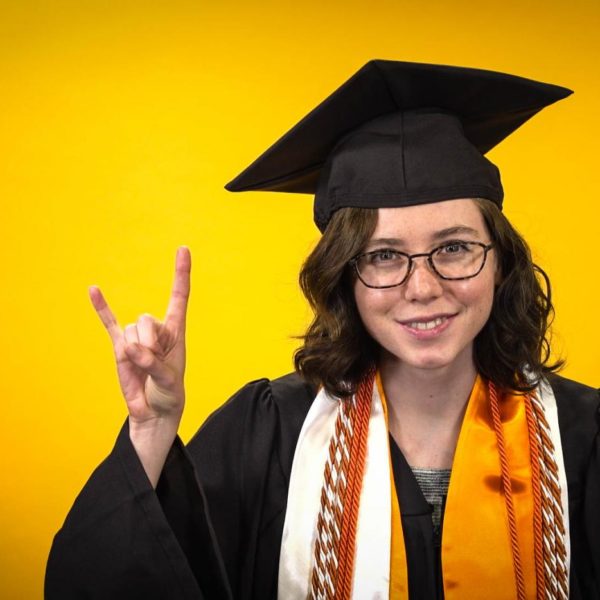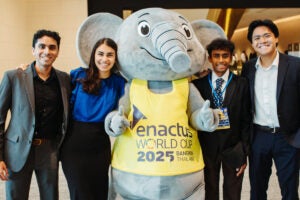Amanda Meriwether was always the “perfect student.” In high school, she was one of only 154 students in the world to achieve a perfect score on their International Baccalaureate tests in 2013.
However, during her time at The University of Texas at Austin, she says she developed a greater sense of perspective, realizing that there is more to focus on than getting perfect grades.
“There’s definitely been that shift from being grade-oriented to learning-oriented; how can I make myself a better person to impact change in the world,” Meriwether said.
Graduating with degrees in biomedical engineering and Plan II Honors – both with honors — she now focuses on helping other students succeed in science, technology, engineering and math (STEM). She did her Plan II thesis on stress levels among engineering students and presented the results at a regional meeting of the American Society for Engineering Education.
“Rather than caring about what grade I earn in my classes, I care more about what knowledge I am gaining and how I can apply that knowledge to solve significant social issues such as access to health care, diversity in STEM and barriers to education,” she said.
We spoke with Meriwether about how college affected her life and her plans after graduation.
Q. Why did you decide to come to UT?
Amanda Meriwether: I went to UT because it was one of the few schools that would support me in pursuing both engineering and liberal arts. In K-12, I loved all of my classes. I didn’t want to restrict my interests to one subject when I went to college. At UT, I chose two majors that I felt would allow me to develop a breadth of knowledge – biomedical engineering and Plan II Honors. It also helped that tuition is relatively affordable. I’d argue that UT is one of the best value schools out there. Also, my family is from Austin.
Q. What were some challenges that helped you become who you are now? What did you learn from them?
Meriwether: One of the biggest challenges for me was overcoming my desire for external validation. Historically, I was motivated by the desire to please others. During my study abroad in Cambridge, my professor helped me realize that I need to act for myself and not for others.
Since that moment, I have tried to ignore other people’s expectations and perceptions of me and focus instead on acting to fulfill my personal values.
Q. What is your favorite college class?
Meriwether: One of my favorite college memories was taking Computational Oncology, taught by Dr. Thomas Yankeelov. In this course, I was able to use the fundamental knowledge I had been gaining in my previous courses to solve problems that had no right answer. We developed differential equation-based computational methods to predict a patient’s tumor growth given preliminary MRI data from that patient. This class propelled me toward my postgraduation plans.
Q. Would you say college changed you?
Meriwether: I think it’s hard to not be changed by college just because you’re going to be taking classes that you never expected to be taking. You’re going to be interacting with people from other parts of Texas and other parts of the U.S. and the world. And unless you stay in your bubble and don’t talk to anybody else, there’s no way it can’t change you.
Q. What are your plans after graduation?
Meriwether: After graduation, I will be moving to the Bay Area to pursue a Ph.D. in bioengineering through the joint program at UC Berkeley/UCSF.
Q. After graduation, how do you hope to change the world?
Meriwether: I hope to change the culture of engineering education. I want to devote my time to the issue of gender and racial diversity in STEM. I want to shift the paradigm of what STEM education is from K through college away from being grade-oriented to more of a growth mindset.



